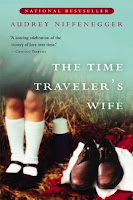 TITLE: The Time Traveler's Wife
TITLE: The Time Traveler's WifeAUTHOR: Audrey Niffenegger
PUBLISHER: Vintage Canada
RATING
5/5 "A month of Sundays"; 4/5 "The eleventh hour"; 3/5 "The nick of time"; 2/5 "Two shakes"; 1/5 "Zero hour"
SCORE: 4/5
I watched my daughter sleeping the other night. I wished I could stop time. I wished I could stay there forever.
My melancholy mood has a name, and it is "The Time Traveler's Wife". Like most novels that claim to be about one thing, it is really about its opposite--here, escaping the bonds of time throws our prison bars into greater relief. The love story at its center is both mundane and profoundly moving. I can't point to any special insight, any masterful display of wordplay, but for days after I wanted to reach out, to cling to my family, to stretch each moment into eternity.
Audrey Niffenegger's novel is about love, but it is also about loss. Clare, the wife in question, is married to Henry, who is sort of an epileptic with a twist--instead of seizures, his fits send his body hurtling randomly backwards or forwards in time. He takes nothing with him; he arrives naked and disoriented, and each time must first set about finding clothing, shelter and food, putting him in mortal danger. Clare must sit and wait, and hope that he will eventually return to her.
The great thing about time travel is it submits docilely to whatever interpretation you care to impose. Pick your metaphor. Relationship woes or dealing with illness and disease are the obvious ones here. Fate and free will are equally plausible. The fleeting nature of time. Life's randomness and unfairness. I suspect it is this malleability of meaning that has made this such a popular book.
Ms Niffenegger concentrates on the story and allows you to scribble whatever meaning you like onto her canvas. What did come through strongly for me was her belief in the power of art to transcend the limits of time. Henry is the son of a violinist and an opera singer. He bonds with teenagers over punk rock music made before they were born. Clare's mother writes poetry, her sister is cellist, she herself is a sculptor. Clare's mother, uncommunicative in life, speaks to her daughter through her poems. Henry's mother lives on in recordings of her performances. Towards the end of the novel, Clare creates a self-portrait, then "I (Clare) place my finger on her forehead, and say, "Vanish", but it is she who will stay; I am the one who is vanishing." Art, in other words, outlives its creator.
It is a moving book, but not especially movingly written. The power comes from the story's conception rather than execution. Henry and Clare are almost too perfect, too pure in their love. I was reminded somewhat of "The Curious Case of Benjamin Button" (the filmic version; I must confess to never having read the original story), in that the remarkable character at the center doesn't do anything especially remarkable with his life.
The only sour note for me was the priviledged backgrounds Ms Niffenegger gives both Henry and Clare. Henry's parents are world-famous, Clare's are fabulously wealthy. While partially this is a plot point--the garden of Clare's house becomes their secret rendezvous--it somewhat blunts the pathos. Consider 23-year-old Ann in "My Life Without Me", struggling to protect her unemployed husband and two infant children from the fact that she is dying of cancer. That gets my sympathy. Being born into immense wealth, staying wealthy because your husband knows all the lottery numbers, but frustrated because he's not always around? Ho-hum.
I know, I know. I'm a stone. The trick is despite the so-so love story, there's enough that lingers with you long enough to get you watching your loved ones at night.
No comments:
Post a Comment